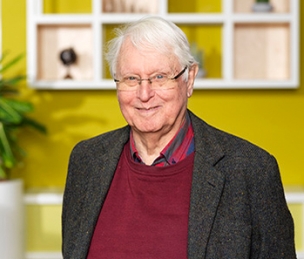In Memoriam: Pieter A.M. Seuren
With regret and sorrow we have to inform you about the demise of Pieter A.M. Seuren (1934-2021). Pieter first joined the LSA in 1957 and has been a member ever since, being inducted as an Honorary Member in 2009.
Pieter Seuren, although born and raised in a completely monolingual Dutch environment, was born roughly as a linguist. During his secondary school days with the Jesuits in Amsterdam, he was already noticed by his interest in languages and linguistic questions. His classical language teacher therefore advised him to study Greek and Latin, which he did at the University of Amsterdam, where he also immediately added general linguistics to his curriculum.
Shortly after completing his studies in Amsterdam, he was appointed first at Cambridge (1967) and then at Oxford (1970), where he tried to introduce the newly emerging generative linguistic theory. In 1974 he returned to the Netherlands where he took up the chair of Philosophy of Language at Radboud University, Nijmegen, The Netherlands. In 1995 he moved over to the Arts Faculty of that university, to become the professor of Theoretical Linguistics. Since his retirement from the chair of Theoretical Linguistics in 1999 he has been a Research Fellow at the Max Planck Institute for Psycholinguistics, also at Nijmegen.
Seuren was mainly interested in semantic issues and that is why he felt very close to the theory of generative semantics, preferring to call it 'semantic syntax'. When Noam Chomsky banned generative semantics, Seuren turned his back on him. However, he also did not subscribe to theories such as those of Richard Montague, which he considered too formal and therefore too far removed from the logic of natural language. His work on the interface between logic and linguistics has focused on the logical system hidden in language. He in no way shunned formalization, but believed that natural language should form the basis for a formal description. On the other hand, he also opposed what he thought was too fuzzy analysis, as he believed to have become commonplace in the work of cognitive linguists. In his last still unpublished book on the foundations of the humanities, he specifically opposes the legacy of positivism in modern linguistics. He advocates a cognitive approach based on natural language in which he tried to model the natural logic of the human species as expressed in natural language. This approach implies a major shift in perspective as regards the applicability of standard modern logic to the semantics of natural language
Seuren did not limit himself to semantics. He supported the study of sociolinguistics in the Netherlands by translating foreign textbooks. Together with Herman Wekker, he was one of the founders of the study of creolistics in the Netherlands. His own research focused on Sranan (Suriname) and Mauritian Creole. He also published an authoritative handbook about the history of linguistics, in which he also left ample room for the history of logic.
Pieter Seuren was a member of the Royal Dutch Academy of Sciences and received an honorary doctorate from the University of Glasgow in 1996. He was made an honorary member of the Linguistic Society of America in 2008. Pieter Seuren was a visiting professor at numerous international universities.
Pieter Seuren was not only a rich source for his friends, collaborators and students, because of his enormous erudition, which is also apparent from his popular scientific publication of capita selecta from history, but also because of his enthusiasm. He was able to transfer his curiosity to others, which made him an inspired and gifted teacher and a much sought-after speaker, who did not spare his listeners. He could be critical and where he perceived sloppy thinking he became polemical.
He will be missed by his former students, colleagues and friends. Most importantly, however, our sympathy goes to his son Raj, his wife and their daughter
Courtesy of Camiel Hamans, assoc. secretary-general of CIPL, Comité International Permanent des Linguistes

